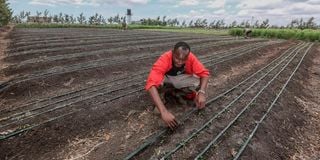Premium
Kenyan start-up recognised for climate adaptation

Eric Bosire installs an irrigation system at a farm in Joska, Machakos County.
Late last year at the Sharm el-Sheikh Climate Change Conference, Eric Bosire, 33, was among the YouthAdapt winners, an annual contest sponsored by the Global Centre on Adaptation, the African Development Bank and Climate Investment Funds.
The competition is part of the Africa Adaptation Acceleration Programme.
Bosire is the founder of Irri-Hub Ke, a climate-smart irrigation solution.
The company was chosen as one of the youth-led enterprises accelerating the climate adaptation agenda in Africa.
It won a grant, which came with business development and training.
Based in Nairobi, Irri-Hub Ke leverages technology to develop affordable, efficient and sustainable irrigation that helps increase productivity and build resilience.
“We design and commercialise irrigation solutions to help small holder farmers maximise yields and increase earnings,” he said.
Irri-Hub Ke supplies rainwater harvesting technology with solar-powered irrigation systems accompanied by other products like greenhouses, shade houses, screen houses, mulching technology and agricultural nets – bird nets, shade nets and insect nets.
“Popular products include drip irrigation gadgets, rain water harvesting systems, solar pumps and vertical gardens for kitchen gardens. Our clients own less than two acres and have limited water supply,” he said.
Irri-Hub Ke supplies almost 10 units of equipment a month, with most customers being from Nyanza, Lower Eastern, Mt Kenya and Western regions.
“What sets us apart from others is that we offer irrigation products, instal and train farmers. We also provide customer support and customised advisory services,” he said.
“We even go an extra mile to form strategic partnerships with companies offering services that complement what we do.”
Irri-Hub Ke sources most parts from different local companies and assembles them.
The agriculture bug bit Bosire even as he studied medical laboratory science at the university.
While growing up in Mumias, he interacted with sugarcane farmers, realising that their agriculture was rain-fed.
“I wanted to change that. The change could only be achieved by encouraging the growing of short term high value crops. That would only be possible if farmers had access to affordable irrigation solutions,” added Bosire.
The scientific knowledge he gained while at university gave Bosire the power to explore the effects of climate change to the environment and food systems.
“It informed me and my team to come up with timely solutions and innovations that addressed the challenges,” he said.
That is what led to the birth of Irri-Hub Ke in 2016.
Six years later, the company has worked with more than 1,500 farmers directly across the country.
Bosire says the programme has had an impact on more than 12,000 people indirectly through job creation and improved living standards.
He adds that there is tremendous change when one switches from traditional to modern ways of farming.
“When a farmer plants maize on a quarter an acre, she will barely get five bags and make about Sh20,000,” Bosire said.
“Another farmer growing onions on the same size of land can harvest at least four tonnes. A kilo of onions is roughly Sh40, translating to Sh160,000 per season of five months.”
One of the biggest problems Irri-Hub Ke faces is changing a farmer’s mindset.
“Many smallholders farmers are wired to the traditional irrigation systems,” Bosire said.
“We have done a lot of training and marketing in an effort to change perception and make them understand what global warming is and how it is affecting our food systems.”
Bosire says affordability is another challenge, as a majority of the farmers are too poor to buy the kits. Irri-Hub Ke has come up with models that can offer flexible payment options.
This piece was produced as part of the 2022 Climate Change Media Partnership, a journalism fellowship organised by Internews Earth Journalism Network and the Stanley Centre for Peace and Security.





